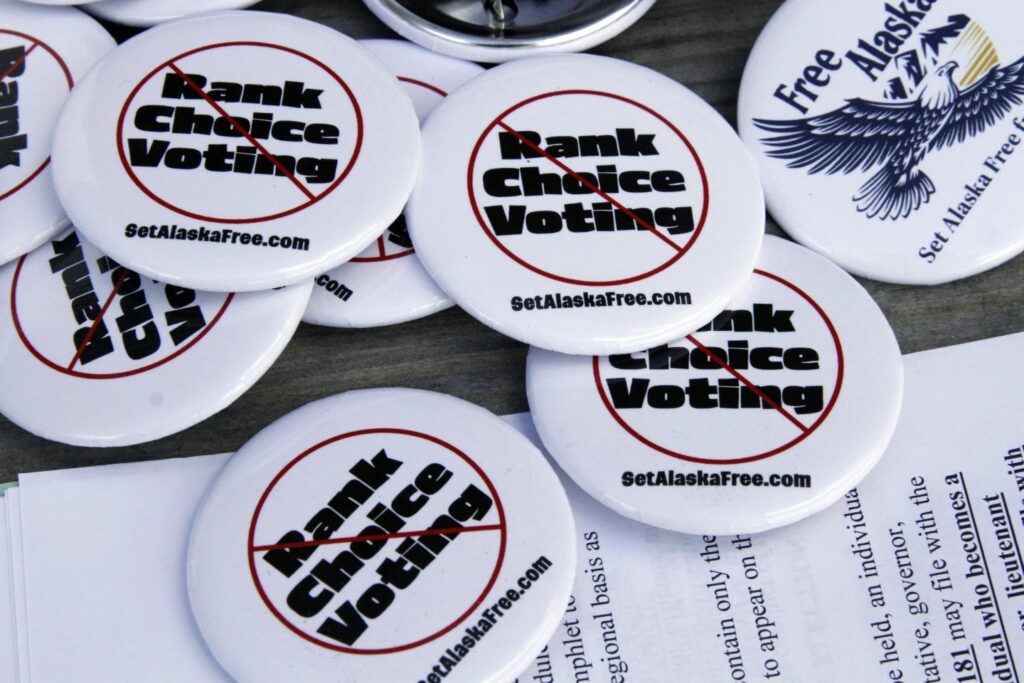The Alaska Democratic Party strongly opposed Eric Hafner’s inclusion on the ballot. They filed a lawsuit seeking to have him disqualified, warning that it sets a “frightening precedent” for other convicted felons to run for office in the state, even while incarcerated.
Opposition From Alaska’s Democratic Party
“It’s extremely troubling that we’ve now given the green light for anybody serving time for a crime to be able to run here,” said Lindsay Kavanaugh, the party’s director. “Even if they have no actual ties to Alaska or ability to serve if elected, the court is saying, ‘sure, put your name on the ballot.’ That shakes the foundations of our representative democracy.”
Kavanaugh said the Alaska Supreme Court decision defies common sense. “This man is sitting in a prison cell in New York,” she noted. “How can he possibly represent Alaskans in Congress? It makes us look like we’re running a circus by letting his name be up for election.”
While conviction of a crime does not explicitly prohibit someone from federal office eligibility, Kavanaugh argues this case crosses ethical lines. It reduces elections to an illogical farce, she said and deceives voters about the actual choices before them.
The Alaska Democratic Party filed suit seeking Hafner’s disqualification, arguing that his status as an incarcerated felon serving time in an out-of-state New York prison bars him from establishing Alaska residency if elected. Allowing Hafner on the ballot sets “an extremely dangerous precedent,” said party director Lindsay Kavanaugh.
“It terrifies me how we have just signaled to anybody convicted of any crime, incarcerated for any amount of time, that you could run in this state,” Kavanaugh added.
During arguments, the party also contended that Alaska’s election statute only provides for replacing a withdrawn top-four candidate with the fifth-place finisher, not the sixth-place candidate, as Hafner was.
However, attorneys for the state dispute that strict reading, arguing that the goal is to provide voters with the fullest choice of candidates possible.
Court Upholds Voters’ Preference for More Choice
In the majority opinion, the Alaska Supreme Court agreed with the state’s position, stressing that the top-four primary system was enacted “to give voters more choice” in elections. Barring additional candidates within legal parameters would undermine that goal, the court ruled.
Dissenting Justice Susan Carney warned that allowing “unelectable” candidates promotes a “false choice” for voters that threatens to “debase the election process.”
Hafner’s long-shot candidacy has captured national attention partly due to the prominent role of convicted felons in Alaska’s election this cycle.
The leading Republican challenger, Nick Begich III, successfully pressured the third- and fourth-place GOP primary finishers to exit the race to consolidate opposition to incumbent Democrat Rep. Mary Peltola.
Peltola made history in 2022 as the first Alaska Native elected to Congress. She defeated Begich twice last year in special and general elections to serve out the term of the late Rep. Don Young.
The upcoming open-seat battle is largely seen as a rematch between Peltola and Begich. But Hafner’s presence could complicate the dynamics.
With no access to campaign resources from his New York prison cell, however, his name recognition and viability remain limited.
Ranked Choice Format Mitigates Effects
In their rulings, both the superior court and Alaska Supreme Court agree that the state’s new system of ranked-choice voting minimizes the potential for minor fringe candidates to play “spoiler.” Voters can rank candidates according to preference, with second choices redistributed if no candidate wins over 50% on the first count.
Nonetheless, Republicans openly celebrated the court decision keeping Hafner in the race over objections from the Democratic Party. “It was a great day for all Alaskans,” declared the state GOP in response.
Democrats plan to appeal to the federal courts. Party attorney David Fox indicated equal protection and voter qualification challenges may be forthcoming. “This case involves critical questions of both state and federal law,” Fox said. “Our fight continues.”
Background on Eric Hafner
Eric Hafner’s bizarre candidacy has puzzled and captivated Alaska’s political scene in recent weeks. The New Jersey man is currently serving his sentence at a federal detention center in New York after convictions for phoning threats to the office of New Jersey Sen. Bob Menendez and other officials.
Despite no connection to Alaska, he filed candidate paperwork from prison to run in the state’s U.S. House Democratic primary. Under federal law, House candidates are only required to be a resident of the state they wish to represent when elected.
Hafner received less than half a percent of the primary vote to finish sixth among 48 candidates. His mother, Carol Hafner, has served as his campaign spokesperson during media interviews regarding the court challenge. “He wants to bring attention to corruption and abuse of power,” she told local station KTVA last month.
This marks Hafner’s third attempt at running for the U.S. House seat of a state where he has never lived. He previously campaigned for Hawaii’s 1st District in 2016 and Oregon’s 1st District in 2020, where he advanced to the general election ballot. His mother, Carol Hafner, has herself run for House seats in Wyoming and Alaska in recent election cycles.
While Hafner stands virtually no chance of mounting a serious challenge, the spectacle of an incarcerated felon appearing on state ballots alongside conventional candidates has prompted ethical debates. And in Alaska’s hotly-contested House race, even the slightest possibility of an unpredictable variable has both parties on edge leading up to the November 8th general election.
Related: Mike Pence Seeks Taxpayer Funds For Unsuccessful Presidential Campaign Debt


